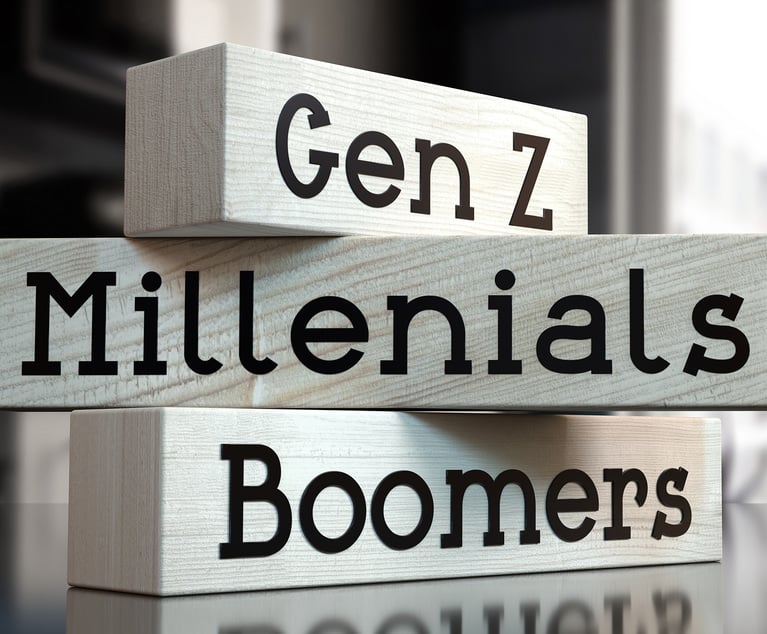Five Things to Know About Apple's $500M Throttling Settlement
Apple Inc. has agreed to pay between $310 million and $500 million to settle class actions alleging that it surreptitiously slowed older iPhones with software upgrades. The deal would include potentially $25 payments to class members and $93 million in attorney fees.
March 02, 2020 at 04:33 PM
5 minute read
The original version of this story was published on The Recorder
 Apple's iPhone 6.
Apple's iPhone 6.
Apple Inc. has agreed to pay up to $500 million to settle class actions alleging that it surreptitiously slowed older iPhones with software upgrades.
Apple said it admitted no wrongdoing but agreed to settle "to eliminate the burdens, distractions, expense and uncertainty of protracted litigation," according to the settlement agreement filed Feb. 28. In a motion for preliminary approval of the settlement, plaintiffs attorneys Joseph Cotchett, principal at Cotchett, Pitre & McCarthy in Burlingame, California, and Laurence King, of Kaplan Fox & Kilsheimer in Oakland, California, who are co-lead counsel of the multidistrict litigation, said that iPhone customers, as class members, would be eligible for $25 payments under the settlement.
"The settlement provides substantial relief to Apple consumers and, going forward, will help ensure that customers are fully informed when asked to update their products," wrote Cotchett in an email. He said the deal was one of the largest consumer product settlements, excluding automobile defect cases such as the Volkswagen emissions scandal.
"This historic settlement represents years of investigation and hotly contested litigation," wrote Mark Molumphy, another principal at Cotchett Pitre. "We are extremely proud to submit this resolution to the court and, if approved, providing immediate cash payments to impacted Apple customers."
Apple representatives and its lawyers, Ted Boutrous and Christopher Chorba, both Los Angeles partners at Gibson, Dunn & Crutcher, did not respond to a request for comment. In court documents, Apple had insisted that the decreased performance speed was necessary in order to stop unexpected shutdowns.
The settlement goes before U.S. District Judge Edward Davila in San Jose, California, on April 3. The deal is subject to the Northern District of California's 2018 guidelines for class actions, as well as Federal Rule 23 of Civil Procedure.
Here are five notable aspects of the settlement:
1. Class members might receive $25 or much, much more.
The settlement includes a non-reversionary fund valued at a $310 million minimum and maximum of $500 million, but the $25 payment depends on how many class members make claims. According to court documents, claims of less than $310 million could result in payments of up to $500 per class member. Claims exceeding $500 million would result in less than $25. The $25 is in addition to a $50 credit Apple offered soon after admitting in 2018 to installing software updates in older iPhones that slowed their battery life.
2. The number of law firms on the case doubled.
Plaintiffs attorneys estimated they would seek $93 million, or 30% of the $310 million fund. The fees, they wrote, include a lodestar of nearly $30 million, which excludes work spent after Nov. 30 or in the related California state court litigation. Davila appointed 39 lawyers to lead the cases—one of the largest leadership teams in recent multidistrict litigation—but more than twice that number of law firms signed the settlement agreement. Molumphy said the additional firms include those that filed cases in California state courts, included in the settlement, or after creation of the MDL.
3. The case originally covered an international class.
The settlement excludes all iPhone users outside the United States. Although the second amended class action included class members from the United States and 39 other countries, plaintiffs lawyers cited "the substantial uncertainty as to the propriety of a worldwide class." They also noted that Davila, in his second dismissal order issued last year, was amenable to some of Apple's concerns involving non-U.S. class members. "Those claims can still be pursued by residents of those other countries in those other countries, or here," Molumphy said. "They're just not part of this class action settlement." The settlement includes service awards of $1,500 to $3,500 for 132 named plaintiffs.
4. The settlement withstood sanctions.
According to the motion for preliminary approval, plaintiffs lawyers conducted 19 depositions and produced more than 7 million pages of documents, but, last year, Davila sanctioned Cotchett and Molumphy for disclosing confidential information at a hearing, a move that Apple had called a "blatant and very serious violation" of a protective order. Davila had not certified the class or ruled on summary judgment, so "it is not an overstatement to say that named plaintiffs faced significant risk," they wrote in the motion.
5. Lawyers expect a potentially high claim rate.
The motion cited a 2019 study by the Federal Trade Commission that found claims rates in 124 consumer class actions fell between 4% and 5%. "Here, class counsel expect the claims rate to be at the high end of the range, or greater, taking into consideration not only defendant's brand recognition, but also the fact that the settlement administrator will be providing direct notice to settlement class members, as well as the substantial media coverage of the issues in the case," the motion says.
This content has been archived. It is available through our partners, LexisNexis® and Bloomberg Law.
To view this content, please continue to their sites.
Not a Lexis Subscriber?
Subscribe Now
Not a Bloomberg Law Subscriber?
Subscribe Now
NOT FOR REPRINT
© 2025 ALM Global, LLC, All Rights Reserved. Request academic re-use from www.copyright.com. All other uses, submit a request to [email protected]. For more information visit Asset & Logo Licensing.
You Might Like
View All
Some Thoughts on What It Takes to Connect With Millennial Jurors

Litigators of the Week: A Directed Verdict Win for Cisco in a West Texas Patent Case

With DEI Rollbacks, Employment Lawyers See Potential For Targeting Corporate Commitment to Equality
7 minute readLaw Firms Mentioned
Trending Stories
- 1Midsize Firm Bressler Amery Absorbs Austin Boutique, Gaining Four Lawyers
- 2Bill Would Allow Californians to Sue Big Oil for Climate-Linked Wildfires, Floods
- 3LinkedIn Suit Says Millions of Profiles Scraped by Singapore Firm’s Fake Accounts
- 4Supreme Court Agrees to Hear Lawsuit Over FBI Raid at Wrong House
- 5What It Takes to Connect With Millennial Jurors
Who Got The Work
J. Brugh Lower of Gibbons has entered an appearance for industrial equipment supplier Devco Corporation in a pending trademark infringement lawsuit. The suit, accusing the defendant of selling knock-off Graco products, was filed Dec. 18 in New Jersey District Court by Rivkin Radler on behalf of Graco Inc. and Graco Minnesota. The case, assigned to U.S. District Judge Zahid N. Quraishi, is 3:24-cv-11294, Graco Inc. et al v. Devco Corporation.
Who Got The Work
Rebecca Maller-Stein and Kent A. Yalowitz of Arnold & Porter Kaye Scholer have entered their appearances for Hanaco Venture Capital and its executives, Lior Prosor and David Frankel, in a pending securities lawsuit. The action, filed on Dec. 24 in New York Southern District Court by Zell, Aron & Co. on behalf of Goldeneye Advisors, accuses the defendants of negligently and fraudulently managing the plaintiff's $1 million investment. The case, assigned to U.S. District Judge Vernon S. Broderick, is 1:24-cv-09918, Goldeneye Advisors, LLC v. Hanaco Venture Capital, Ltd. et al.
Who Got The Work
Attorneys from A&O Shearman has stepped in as defense counsel for Toronto-Dominion Bank and other defendants in a pending securities class action. The suit, filed Dec. 11 in New York Southern District Court by Bleichmar Fonti & Auld, accuses the defendants of concealing the bank's 'pervasive' deficiencies in regards to its compliance with the Bank Secrecy Act and the quality of its anti-money laundering controls. The case, assigned to U.S. District Judge Arun Subramanian, is 1:24-cv-09445, Gonzalez v. The Toronto-Dominion Bank et al.
Who Got The Work
Crown Castle International, a Pennsylvania company providing shared communications infrastructure, has turned to Luke D. Wolf of Gordon Rees Scully Mansukhani to fend off a pending breach-of-contract lawsuit. The court action, filed Nov. 25 in Michigan Eastern District Court by Hooper Hathaway PC on behalf of The Town Residences LLC, accuses Crown Castle of failing to transfer approximately $30,000 in utility payments from T-Mobile in breach of a roof-top lease and assignment agreement. The case, assigned to U.S. District Judge Susan K. Declercq, is 2:24-cv-13131, The Town Residences LLC v. T-Mobile US, Inc. et al.
Who Got The Work
Wilfred P. Coronato and Daniel M. Schwartz of McCarter & English have stepped in as defense counsel to Electrolux Home Products Inc. in a pending product liability lawsuit. The court action, filed Nov. 26 in New York Eastern District Court by Poulos Lopiccolo PC and Nagel Rice LLP on behalf of David Stern, alleges that the defendant's refrigerators’ drawers and shelving repeatedly break and fall apart within months after purchase. The case, assigned to U.S. District Judge Joan M. Azrack, is 2:24-cv-08204, Stern v. Electrolux Home Products, Inc.
Featured Firms
Law Offices of Gary Martin Hays & Associates, P.C.
(470) 294-1674
Law Offices of Mark E. Salomone
(857) 444-6468
Smith & Hassler
(713) 739-1250







